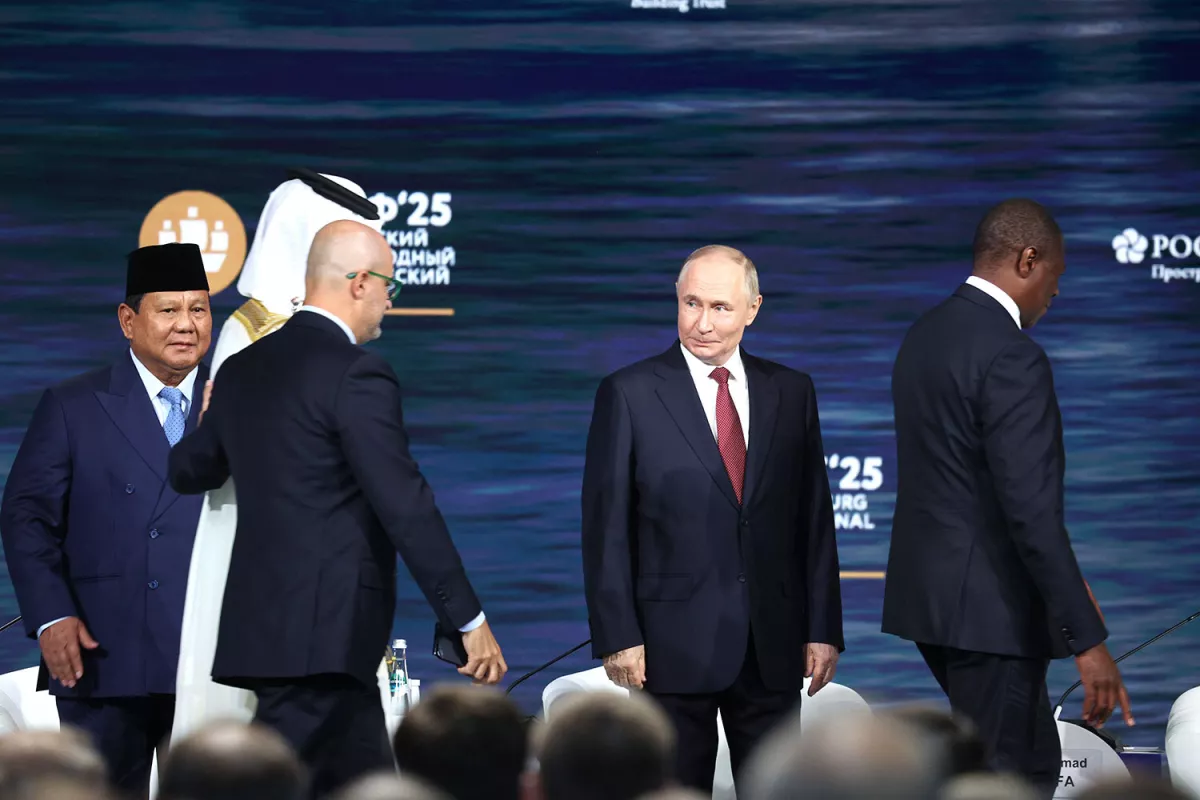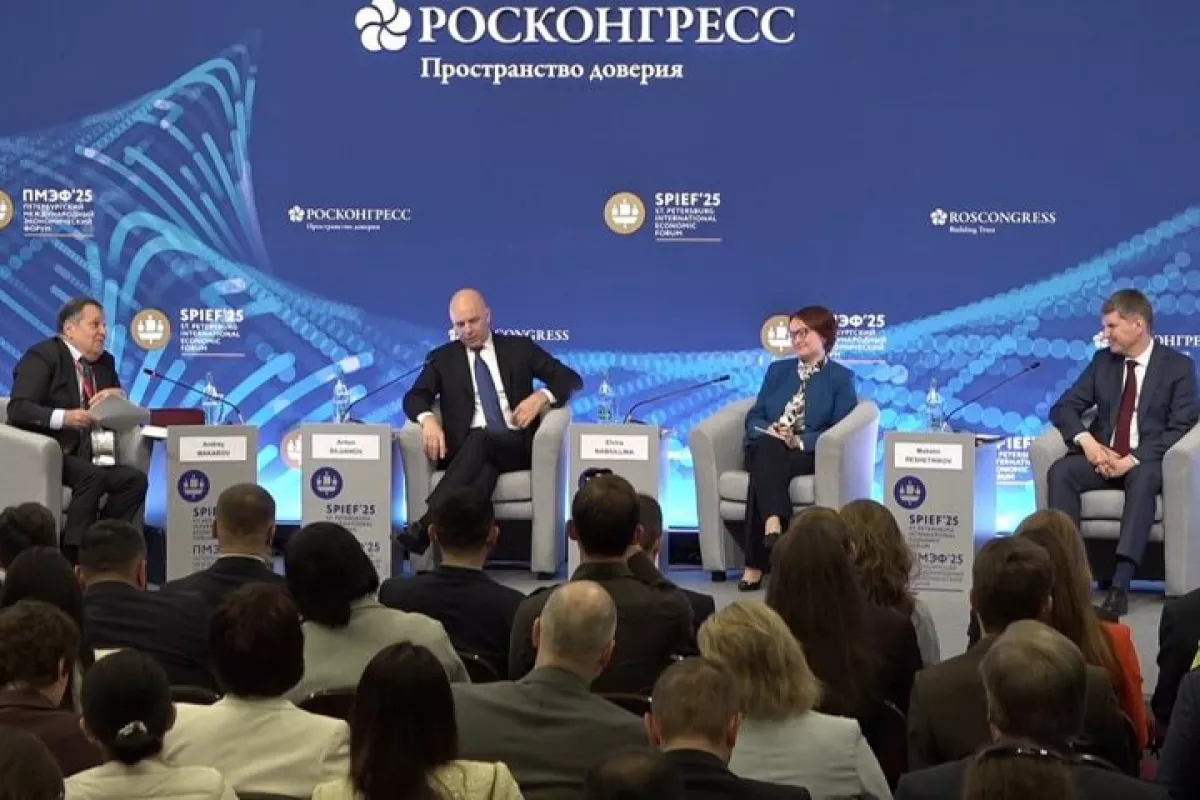Russia’s economic hardships aired at prestigious forum by government leaders SPIEF 2025 confronts high interest rates, inflation
The renowned St. Petersburg International Economic Forum kicked off this week with a rather surprising and rare admission by Russian government leaders that the country is grappling with economic hardships, including high inflation and soaring interest rates. President Vladimir Putin used the platform to both address these concerns and promote Russia’s pivot toward non-Western markets through stronger BRICS ties.
President Vladimir Putin highlighted the growing economic clout of the BRICS alliance during his speech on June 20 and Russia’s strategic reorientation toward non-Western markets, as reported on by the Moscow Times, using the plenary session of the annual SPIEF to promote what he called a “restructuring” of Russia’s economy.
“BRICS makes up 40% of the global economy,” the Russian leader stated in his speech. “And it’s obvious that this share will only continue to grow. As they say, that’s a medical fact. This growth will primarily come from the dynamic countries of the Global South.”
Putin has consistently presented BRICS — originally comprising Brazil, Russia, India, China, and South Africa — as a geopolitical alternative to Western dominance. The group, which has recently added Egypt, Ethiopia, Indonesia, Iran, Saudi Arabia, and the United Arab Emirates, was again a major topic in the president’s remarks at this year’s forum, just as it was in 2024.
Moderated by Lebanese journalist Nadim Koteich, the panel included a lineup of political figures such as Indonesian President Prabowo Subianto, Chinese Vice Premier Ding Xuexiang, Bahraini royal Nasser bin Hamad Al-Khalifa, and South African Deputy President Paul Mashatile, in addition to Putin.

In his address, Putin announced that Russia’s GDP growth had exceeded the global average in recent years, even amid what he described as a “complex external environment.” He underscored the increasing share of non-oil and gas revenues, noting that Russia was boosting exports to countries like China and India as it seeks to shift away from its traditional reliance on hydrocarbons.
Putin referenced data showing GDP rose by 1.5 percent over the year’s first four months. Yet, as an article by Politico noted, many analysts argue that the increase stems mainly from heightened defence sector output linked to the war in Ukraine. Meanwhile, civilian industries have slowed notably as the state has phased out programs like housing subsidies over the past year.
According to their article, the Russian government is experiencing its hardest time since the outbreak of the 2022 war "by the fact that global prices for crude oil, exports of which generate a third of its revenue, have slumped to their lowest in over three years as Saudi Arabia and its Gulf allies opened a battle to win back global market share from higher-cost producers in the United States and elsewhere."
Putin opened his proposals by referencing the need to respond to “tectonic changes” in the global landscape, including the persistent conflict in the Middle East. At the same time, he warned that Russia must act to prevent any loss of economic momentum. “Some specialists and experts are pointing to the risks of stagnation or even a recession. This, of course, must not be allowed to happen under any circumstances.”
His caution came amid rising concern over Russia’s economic direction. Economy Minister Maxim Reshetnikov and Sberbank CEO German Gref both cited the Central Bank’s 20% key rate and inflation near 10% as major threats to growth. Reshetnikov issued his warning on the forum’s opening day on June 19, saying that while official indicators suggest growth continues, they offer “just a rear-view mirror.” He added that current business sentiment strongly indicates the economy is “on the brink of a recession.”

During his remarks, Putin rejected the narrative that rising defence spending now underpins Russia’s economy. He reiterated his call to achieve “technological sovereignty” despite sweeping Western sanctions and the withdrawal of foreign businesses.
Calling for more adaptability in the defence sector, Putin pushed for greater overlap between military and civilian manufacturing.
“We need to move away from dividing enterprises into military and civilian,” he said. “The most successful holdings are those that handle both types of tasks. Our defence industry has gained good momentum. Enterprises have increased production and are developing new types of weapons.”
Having earned the nickname of the “Russian Davos” in past years, SPIEF was long known for attracting key Western executives and policymakers, with landmark deals such as Nord Stream emerging from past editions. Since 2022, the event has reflected Moscow’s pivot toward countries in Asia and Africa amid its political and economic break with the West.
By Nazrin Sadigova








